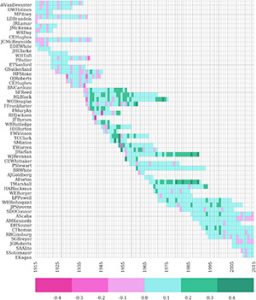In a paper in the peer-reviewed science journal PLOS ONE, Chicago-Kent College of Law Professor Daniel Martin Katz, Chicago-Kent researcher Michael J. Bommarito II, and Professor Josh Blackman of South Texas College of Law Houston construct a model that predicts with more than 70 percent accuracy the votes and case outcomes of the Supreme Court of the United States (SCOTUS).
The prediction model utilizes a time-evolving, random-forest classifer, which is an algorithm for modeling data based on decision trees. The authors used the model to predict more than 240,000 justice votes and 28,000 case outcomes spanning the years 1816 to 2015.
The article, titled “A General Approach for Predicting the Behavior of the Supreme Court of the United States,” was published April 12, 2017, in PLOS ONE.
The new model developed by the authors improves on the general level of prediction achieved by prior work and is the only existing model applicable to the entire past and future of the court rather than a single term. The model outperforms a range of baseline models including one null model that is optimized using in-sample information.
“Our results represent an important advance for the science of quantitative legal prediction and portend a range of other potential applications,” said Katz.
Katz is a scientist, technologist, and legal scholar who applies an innovative polytechnic approach to teaching law. He directs The Law Lab @ Illinois Tech – Chicago-Kent College of Law. Both his scholarship and teaching integrate science, technology, engineering, and mathematics. He teaches Civil Procedure, E-Discovery, Legal Analytics, and Practice & Professionalism at Chicago-Kent and spearheads new initiatives to teach law students how to leverage technology and entrepreneurship in their future legal careers.
Bommarito is the head of research at The Law Lab @ Chicago-Kent, a premier, interdisciplinary teaching and research center focused on legal innovation and technology.
Blackman, a faculty member at South Texas College of Law Houston, focuses his scholarship on constitutional law, the United States Supreme Court, and the intersection of law and technology.

